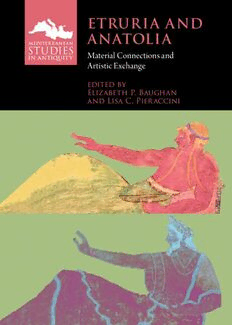
Etruria and Anatolia: Material Connections and Artistic Exchange PDF
369 Pages·2023·26.089 MB·English
Most books are stored in the elastic cloud where traffic is expensive. For this reason, we have a limit on daily download.
Preview Etruria and Anatolia: Material Connections and Artistic Exchange
Description:
Striking similarities in Etruscan and Anatolian material culture reveal various forms of contact and exchange between these regions on opposite sides of the Mediterranean. This is the first comprehensive investigation of these connections, approaching both cultures as agents of artistic exchange rather than as side characters in a Greek-focused narrative. It synthesizes a wide range of material evidence from c. 800 – 300 BCE, from tomb architecture and furniture to painted vases, terracotta reliefs, and magic amulets. By identifying shared practices, common visual language, and movements of objects and artisans (from both east to west and west to east), it illuminates many varied threads of the interconnected ancient Mediterranean fabric. Rather than trying to account for the similarities with any one, overarching theory, this volume presents multiple, simultaneous modes and implications of connectivity while also recognizing the distinct local identities expressed through shared artistic and cultural traditions.
See more
The list of books you might like
Most books are stored in the elastic cloud where traffic is expensive. For this reason, we have a limit on daily download.
